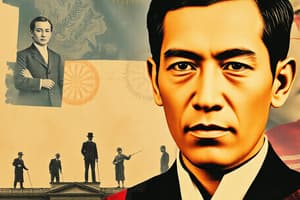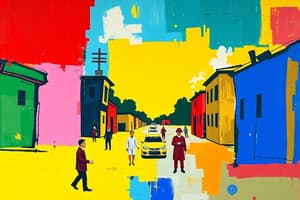Podcast
Questions and Answers
What was the main concern of Filipino propagandists in Spain regarding education in the Philippines?
What was the main concern of Filipino propagandists in Spain regarding education in the Philippines?
The old methods of education, which they believed hindered intellectual development and made it difficult for Filipino students to adapt to studies in Spain.
What was the 'magister dixit' referred to in the text, and what was its impact on education in the Philippines?
What was the 'magister dixit' referred to in the text, and what was its impact on education in the Philippines?
The 'magister dixit' referred to an outdated teaching method that emphasized the authority of the teacher, which led to a shallow and unengaging learning experience for students.
What challenge did Filipino students face when pursuing their studies in Spain, and how was it related to the education system in the Philippines?
What challenge did Filipino students face when pursuing their studies in Spain, and how was it related to the education system in the Philippines?
Filipino students faced difficulties in adjusting to the Spanish education system due to the inadequate preparation they received in the Philippines, which made it hard for them to catch up.
What was the ultimate goal of the Filipino propagandists in calling for reforms in Philippine education?
What was the ultimate goal of the Filipino propagandists in calling for reforms in Philippine education?
What was the underlying problem with the courses offered in the Philippines, according to the Filipino propagandists?
What was the underlying problem with the courses offered in the Philippines, according to the Filipino propagandists?
Match the following concepts with their descriptions:
Match the following concepts with their descriptions:
Match the following terms with their relevant information:
Match the following terms with their relevant information:
Match the following concepts with their relationships:
Match the following concepts with their relationships:
Match the following concepts with their characteristics:
Match the following concepts with their characteristics:
Match the following concepts with their implications:
Match the following concepts with their implications:
Study Notes
Challenges in Philippine Education in the 19th Century
- Filipino propagandists in Spain criticized the state of education in the Philippines in the 19th century.
- They identified old methods hindering intellectual development, including the magister dixit approach, as a key obstacle.
- The Filipinos also criticized the rudimentary education system, which they believed was shallow and limited.
- The quality of courses offered was seen as parallel to the professor's knowledge, implying a lack of depth and progress.
- These limitations made it difficult for Filipino students to adapt and catch up when they pursued further studies in Spain.
- The propagandists advocated for reforms in Philippine education to address these shortcomings.
The Changing Landscape of Learning
- The 21st century brings new challenges and considerations for education, much like those faced in the past century.
Evolution of Pedagogy
- Lecture-based classes were the foundation of learning in previous centuries.
- There is a growing corpus of literature arguing for a more student-centered pedagogy.
- This shift is driven by the assumption that different times require different skills from learners.
- The skills that were valuable in the past may not be applicable today.
Studying That Suits You
Use AI to generate personalized quizzes and flashcards to suit your learning preferences.
Description
This quiz assesses knowledge on the state of education in the Philippines during the 19th century, specifically the criticisms of Filipino propagandists in Spain.




